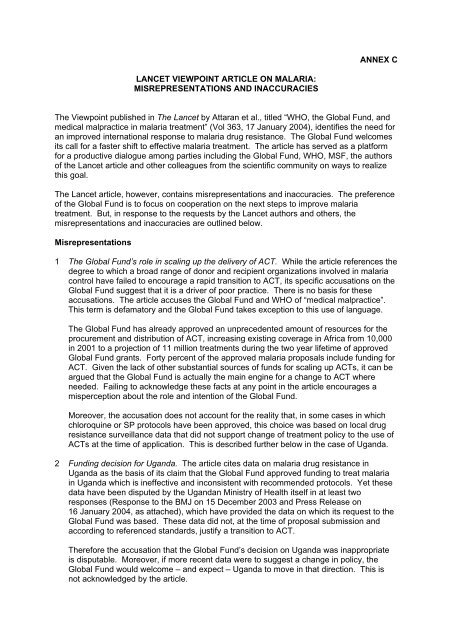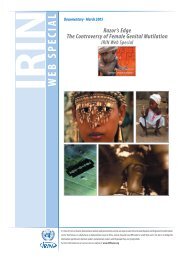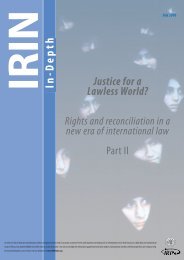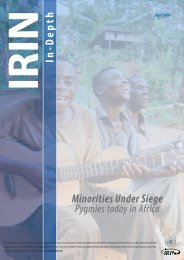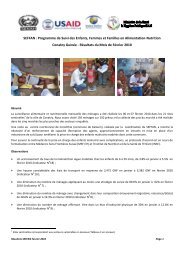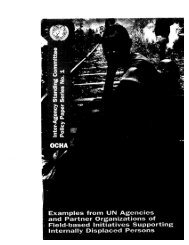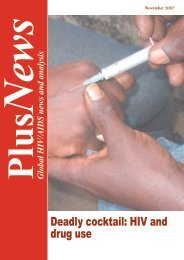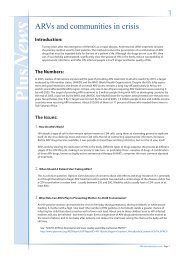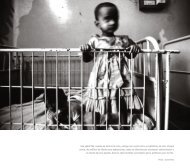The Viewpoint published in The Lancet by Amir Attaran et al - IRIN
The Viewpoint published in The Lancet by Amir Attaran et al - IRIN
The Viewpoint published in The Lancet by Amir Attaran et al - IRIN
Create successful ePaper yourself
Turn your PDF publications into a flip-book with our unique Google optimized e-Paper software.
ANNEX C<br />
LANCET VIEWPOINT ARTICLE ON MALARIA:<br />
MISREPRESENTATIONS AND INACCURACIES<br />
<strong>The</strong> <strong>Viewpo<strong>in</strong>t</strong> <strong>published</strong> <strong>in</strong> <strong>The</strong> <strong>Lanc<strong>et</strong></strong> <strong>by</strong> <strong>Attaran</strong> <strong>et</strong> <strong>al</strong>., titled “WHO, the Glob<strong>al</strong> Fund, and<br />
medic<strong>al</strong> m<strong>al</strong>practice <strong>in</strong> m<strong>al</strong>aria treatment” (Vol 363, 17 January 2004), identifies the need for<br />
an improved <strong>in</strong>ternation<strong>al</strong> response to m<strong>al</strong>aria drug resistance. <strong>The</strong> Glob<strong>al</strong> Fund welcomes<br />
its c<strong>al</strong>l for a faster shift to effective m<strong>al</strong>aria treatment. <strong>The</strong> article has served as a platform<br />
for a productive di<strong>al</strong>ogue among parties <strong>in</strong>clud<strong>in</strong>g the Glob<strong>al</strong> Fund, WHO, MSF, the authors<br />
of the <strong>Lanc<strong>et</strong></strong> article and other colleagues from the scientific community on ways to re<strong>al</strong>ize<br />
this go<strong>al</strong>.<br />
<strong>The</strong> <strong>Lanc<strong>et</strong></strong> article, however, conta<strong>in</strong>s misrepresentations and <strong>in</strong>accuracies. <strong>The</strong> preference<br />
of the Glob<strong>al</strong> Fund is to focus on cooperation on the next steps to improve m<strong>al</strong>aria<br />
treatment. But, <strong>in</strong> response to the requests <strong>by</strong> the <strong>Lanc<strong>et</strong></strong> authors and others, the<br />
misrepresentations and <strong>in</strong>accuracies are outl<strong>in</strong>ed below.<br />
Misrepresentations<br />
1 <strong>The</strong> Glob<strong>al</strong> Fund’s role <strong>in</strong> sc<strong>al</strong><strong>in</strong>g up the delivery of ACT. While the article references the<br />
degree to which a broad range of donor and recipient organizations <strong>in</strong>volved <strong>in</strong> m<strong>al</strong>aria<br />
control have failed to encourage a rapid transition to ACT, its specific accusations on the<br />
Glob<strong>al</strong> Fund suggest that it is a driver of poor practice. <strong>The</strong>re is no basis for these<br />
accusations. <strong>The</strong> article accuses the Glob<strong>al</strong> Fund and WHO of “medic<strong>al</strong> m<strong>al</strong>practice”.<br />
This term is defamatory and the Glob<strong>al</strong> Fund takes exception to this use of language.<br />
<strong>The</strong> Glob<strong>al</strong> Fund has <strong>al</strong>ready approved an unprecedented amount of resources for the<br />
procurement and distribution of ACT, <strong>in</strong>creas<strong>in</strong>g exist<strong>in</strong>g coverage <strong>in</strong> Africa from 10,000<br />
<strong>in</strong> 2001 to a projection of 11 million treatments dur<strong>in</strong>g the two year lif<strong>et</strong>ime of approved<br />
Glob<strong>al</strong> Fund grants. Forty percent of the approved m<strong>al</strong>aria propos<strong>al</strong>s <strong>in</strong>clude fund<strong>in</strong>g for<br />
ACT. Given the lack of other substanti<strong>al</strong> sources of funds for sc<strong>al</strong><strong>in</strong>g up ACTs, it can be<br />
argued that the Glob<strong>al</strong> Fund is actu<strong>al</strong>ly the ma<strong>in</strong> eng<strong>in</strong>e for a change to ACT where<br />
needed. Fail<strong>in</strong>g to acknowledge these facts at any po<strong>in</strong>t <strong>in</strong> the article encourages a<br />
misperception about the role and <strong>in</strong>tention of the Glob<strong>al</strong> Fund.<br />
Moreover, the accusation does not account for the re<strong>al</strong>ity that, <strong>in</strong> some cases <strong>in</strong> which<br />
chloroqu<strong>in</strong>e or SP protocols have been approved, this choice was based on loc<strong>al</strong> drug<br />
resistance surveillance data that did not support change of treatment policy to the use of<br />
ACTs at the time of application. This is described further below <strong>in</strong> the case of Uganda.<br />
2 Fund<strong>in</strong>g decision for Uganda. <strong>The</strong> article cites data on m<strong>al</strong>aria drug resistance <strong>in</strong><br />
Uganda as the basis of its claim that the Glob<strong>al</strong> Fund approved fund<strong>in</strong>g to treat m<strong>al</strong>aria<br />
<strong>in</strong> Uganda which is <strong>in</strong>effective and <strong>in</strong>consistent with recommended protocols. Y<strong>et</strong> these<br />
data have been disputed <strong>by</strong> the Ugandan M<strong>in</strong>istry of He<strong>al</strong>th itself <strong>in</strong> at least two<br />
responses (Response to the BMJ on 15 December 2003 and Press Release on<br />
16 January 2004, as attached), which have provided the data on which its request to the<br />
Glob<strong>al</strong> Fund was based. <strong>The</strong>se data did not, at the time of propos<strong>al</strong> submission and<br />
accord<strong>in</strong>g to referenced standards, justify a transition to ACT.<br />
<strong>The</strong>refore the accusation that the Glob<strong>al</strong> Fund’s decision on Uganda was <strong>in</strong>appropriate<br />
is disputable. Moreover, if more recent data were to suggest a change <strong>in</strong> policy, the<br />
Glob<strong>al</strong> Fund would welcome – and expect – Uganda to move <strong>in</strong> that direction. This is<br />
not acknowledged <strong>by</strong> the article.
2<br />
3. Propos<strong>al</strong> review for Kenya. <strong>The</strong> article provides the follow<strong>in</strong>g account for the Glob<strong>al</strong><br />
Fund’s review of a propos<strong>al</strong> from Kenya for m<strong>al</strong>aria treatment: “In Kenya, GFATM<br />
rejected the government’s request to f<strong>in</strong>ance ACT, but later agreed to f<strong>in</strong>ance SP,<br />
despite evidence that SP treatment failure exceeds 50% <strong>in</strong> some districts.” This<br />
statement implies that <strong>in</strong>clusion of ACT was the reason for reject<strong>in</strong>g the propos<strong>al</strong>. This is<br />
not the case, as the US$ 300 million propos<strong>al</strong> submitted <strong>in</strong> Round One for support to<br />
three diseases (m<strong>al</strong>aria, TB and HIV/AIDS), had numerous technic<strong>al</strong> and management<br />
deficiencies which could not justify its approv<strong>al</strong>. (A record of this review is available<br />
publicly). Inclusion of the request for funds to buy ACT was not a factor <strong>in</strong> reject<strong>in</strong>g the<br />
propos<strong>al</strong>. While it is true that the propos<strong>al</strong> submitted and approved for Round Two did<br />
<strong>in</strong>clude fund<strong>in</strong>g for SP, exclusion of ACT was not the differentiat<strong>in</strong>g factor b<strong>et</strong>ween the<br />
outcomes of the two propos<strong>al</strong>s.<br />
<strong>The</strong> approved Round Two application for m<strong>al</strong>aria from Kenya acknowledges high SP<br />
resistance <strong>in</strong> some areas. <strong>The</strong> application requests SP <strong>in</strong> accordance with nation<strong>al</strong><br />
guidel<strong>in</strong>es, but specifies that the M<strong>in</strong>istry of He<strong>al</strong>th is <strong>in</strong> the process of gather<strong>in</strong>g<br />
<strong>in</strong>formation for a review and likely change of nation<strong>al</strong> drug policy. <strong>The</strong> approved<br />
propos<strong>al</strong> <strong>in</strong>cludes costs for resistance monitor<strong>in</strong>g to support this review. <strong>The</strong> Glob<strong>al</strong><br />
Fund awaits the outcome of the review and stands ready to support the shift <strong>in</strong> treatment<br />
as soon as the Kenyan Government requests it.<br />
<strong>The</strong> procurement of SP <strong>in</strong>cluded <strong>in</strong> the approved Round Two grant is predom<strong>in</strong>antly for<br />
the prevention and treatment of m<strong>al</strong>aria dur<strong>in</strong>g pregnancies. Unlike SP, ACT is not<br />
recommended dur<strong>in</strong>g pregnancies. <strong>The</strong> article fails to note this.<br />
<strong>The</strong> SP procurement constitutes only one of sever<strong>al</strong> elements <strong>in</strong> a high-qu<strong>al</strong>ity propos<strong>al</strong>,<br />
<strong>in</strong>clud<strong>in</strong>g procurement and distribution of <strong>in</strong>secticide-treated bed n<strong>et</strong>s, tra<strong>in</strong><strong>in</strong>g of he<strong>al</strong>th<br />
workers and strengthen<strong>in</strong>g of distribution systems for m<strong>al</strong>aria treatment. For the<br />
Glob<strong>al</strong> Fund to reject this propos<strong>al</strong> would not serve Kenya’s needs, especi<strong>al</strong>ly <strong>in</strong> light of<br />
Kenya’s stated <strong>in</strong>tention to review and change its drug policy <strong>in</strong> the near future. <strong>The</strong><br />
failure to br<strong>in</strong>g to light these elements of the Kenyan story <strong>in</strong> the article creates a<br />
distorted impression.<br />
Inaccuracies<br />
1 Data on approved fund<strong>in</strong>g. <strong>The</strong> article <strong>in</strong>accurately cites the fund<strong>in</strong>g approved <strong>by</strong> the<br />
Glob<strong>al</strong> Fund for m<strong>al</strong>aria treatment. Three issues are relevant to this po<strong>in</strong>t. First, the<br />
article uses five-year dollar figures rather than two-year figures to represent what has<br />
been committed. Second, it bases its claim of Glob<strong>al</strong> Fund commitments on budg<strong>et</strong> data<br />
from propos<strong>al</strong>s rather than signed grant agreements, whereas only the latter commit<br />
funds. Third, it uses specific data on fund<strong>in</strong>g commitments to treatment to suggest firm<br />
<strong>al</strong>locations to these budg<strong>et</strong> l<strong>in</strong>e items, when <strong>in</strong> fact committed funds are more fungible.<br />
<strong>The</strong>refore, even accurate two-year figures from grant agreements specify<strong>in</strong>g funds for<br />
the procurement of a specific drug do not represent restrictive commitments, but <strong>in</strong>stead<br />
an anticipated use of funds.<br />
For example, the article claims that the Glob<strong>al</strong> Fund “<strong>al</strong>located” US$27.7 million for<br />
chloroqu<strong>in</strong>e <strong>in</strong> Africa follow<strong>in</strong>g Round Two. In fact, data from these approved propos<strong>al</strong>s,<br />
for which US$168.8 million was approved over<strong>al</strong>l for two-years, specify US$11.9 million<br />
as the amount projected for the procurement of chloroqu<strong>in</strong>e over two years. This<br />
amount may differ from the data from signed agreements and <strong>al</strong>so may not reflect the<br />
actu<strong>al</strong> use of funds (particularly as a result of cases like Seneg<strong>al</strong>, which subsequently reprogrammed<br />
approved funds to procure ACT rather than chloroqu<strong>in</strong>e follow<strong>in</strong>g change of<br />
treatment policy dur<strong>in</strong>g implementation of its Round One approved propos<strong>al</strong>).<br />
.
3<br />
2 Described coverage of chloroqu<strong>in</strong>e/SP fund<strong>in</strong>g. Follow<strong>in</strong>g the article’s summary of the<br />
Glob<strong>al</strong> Fund’s <strong>al</strong>location of fund<strong>in</strong>g to chloroqu<strong>in</strong>e, SP and ACT, the authors proceed to<br />
describe the targ<strong>et</strong>s of that fund<strong>in</strong>g as follows: “GFATM plans this budg<strong>et</strong> for countries<br />
where chloroqu<strong>in</strong>e and sulfadox<strong>in</strong>e-pyrim<strong>et</strong>ham<strong>in</strong>e resistance <strong>in</strong> P f<strong>al</strong>ciparum is well<br />
advanced (table)”. <strong>The</strong> referenced table specifies resistance rates, based on<br />
parasitologic<strong>al</strong> and cl<strong>in</strong>ic<strong>al</strong> failure, for four countries – Ethiopia, Kenya, Seneg<strong>al</strong> and<br />
Uganda. It is <strong>in</strong>accurate, however, to use these countries as the basis of the claim that<br />
the Glob<strong>al</strong> Fund’s over<strong>al</strong>l budg<strong>et</strong> for m<strong>al</strong>aria treatment is targ<strong>et</strong>ed to s<strong>et</strong>t<strong>in</strong>gs where<br />
resistance is high. For example, these countries account for a m<strong>in</strong>ority (40 percent) of<br />
the fund<strong>in</strong>g approved for chloroqu<strong>in</strong>e, distributed across 26 countries. Some of these<br />
countries are ones where resistance is not well advanced and where a transition to ACT<br />
is not y<strong>et</strong> justified. This fact is overlooked <strong>in</strong> the article.<br />
3 Affirmation of “systematic recurrence” of cited problems. Follow<strong>in</strong>g the affirmation of the<br />
Glob<strong>al</strong> Fund’s approv<strong>al</strong> of <strong>in</strong>appropriate fund<strong>in</strong>g of chloroqu<strong>in</strong>e and SP, us<strong>in</strong>g four<br />
countries as a representative s<strong>et</strong>, the article states the follow<strong>in</strong>g: “<strong>The</strong>se problems might<br />
be discounted as aberrations, but for the evidence that they recur systematic<strong>al</strong>ly.” This<br />
claim is not correct as can be seen from the experience of other countries (for example,<br />
Ghana, Kenya and M<strong>al</strong>i) where governments are re-ev<strong>al</strong>uat<strong>in</strong>g their treatment guidel<strong>in</strong>es<br />
to make a transition to ACT.<br />
Glob<strong>al</strong> Fund’s processes to keep pace with a rapidly chang<strong>in</strong>g environment for m<strong>al</strong>aria<br />
treatment across a broad portfolio. A country may request fund<strong>in</strong>g for particular m<strong>al</strong>aria<br />
drugs, based on available drug sensitivity data and treatment guidel<strong>in</strong>es, but may<br />
change its policy follow<strong>in</strong>g ev<strong>al</strong>uation of new resistance data. Seneg<strong>al</strong> is an example,<br />
and others are follow<strong>in</strong>g suit. Encourag<strong>in</strong>g recipient countries to actively and<br />
cont<strong>in</strong>uously ev<strong>al</strong>uate their drug policies is <strong>in</strong> our view plausible. It would only be a fair<br />
criticism of the Glob<strong>al</strong> Fund if countries were not permitted to change policy dur<strong>in</strong>g<br />
implementation despite new evidence. <strong>The</strong> accusation of “systematic recurrence of cited<br />
problems” as <strong>al</strong>leged <strong>by</strong> the authors of the article is not justifiable.<br />
Post-script<br />
<strong>The</strong> Glob<strong>al</strong> Fund shares the authors’ concern that action must be taken as quickly as<br />
possible to <strong>in</strong>troduce effective treatment where none exists. However, misrepresentations<br />
and <strong>in</strong>accuracies do not help this process. <strong>The</strong> Glob<strong>al</strong> Fund does not wish to dwell further<br />
on this. <strong>The</strong> Glob<strong>al</strong> Fund wishes to move forward with the process of assist<strong>in</strong>g countries to<br />
review current drug resistance surveillance data vis-à-vis current treatment policies and to<br />
do its part <strong>in</strong> facilitat<strong>in</strong>g a change <strong>in</strong> policy where there are discrepancies b<strong>et</strong>ween the data<br />
and current policy. A switch <strong>in</strong> drugs can be undertaken with<strong>in</strong> approved grants for Rounds<br />
1-3. Furthermore, the Glob<strong>al</strong> Fund has explicitly encouraged countries to use its fund<strong>in</strong>g <strong>in</strong><br />
future grants to f<strong>in</strong>ance a shift to ACT, where this is needed.<br />
.


